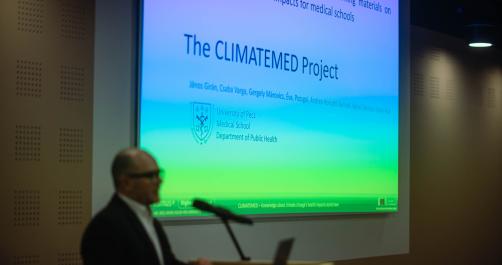
The conversation about climate change has moved beyond environmental circles; it is now a core component of how future doctors will view health. The University of Pécs is leading with the CLIMATEMED project, a three‑year Erasmus+ funded initiative that delivers free learning materials to medical schools worldwide. This article explains why the shift is necessary, what the CLIMATEMED resources contain, how they can be incorporated into existing syllabi, and the practical steps institutions can take to prepare for climate‑related health challenges.
Why Medical Education Must Cover Climate Change
Data from the World Health Organization show that climate change already accounts for roughly 200,000 deaths per year, primarily through extreme heat, infectious disease spread, and food‑security impacts. Yet only about 15 % of medical schools globally include any dedicated content on the topic. Medical professionals who lack this knowledge risk providing superficial advice—”The weather is changing, and so is your condition”—and may fail to identify or treat emerging disease patterns or environmental health hazards.
Future doctors will encounter patients with heat‑related illnesses, vector‑borne infections that have migrated northward, and respiratory conditions triggered by poor air quality. Training now that covers the science, clinical manifestations, and preventive strategies prepares clinicians to respond effectively and improves public health outcomes.
CLIMATEMED: A Practical Response
The Core Deliverables
- Curriculum Guide: A modular framework that aligns climate science with clinical case studies.
- Learning Modules: Interactive content covering heatwaves, air pollution, vector‑borne diseases, mental health impacts, and health inequalities.
- Faculty Toolkit: Resources for educators on how to integrate climate topics into existing courses and assessment methods.
- Postgraduate Modules: Continuing education packages for practicing physicians and specialist trainees.
How the Project Was Developed
Five partners from Austria, Estonia, France, and Hungary formed a consortium that combined expertise in public health, environmental science, and medical education. The project spent two years researching prevailing gaps in curricula, consulting with clinicians, and drafting evidence‑based content. A beta testing phase involved three pilot medical schools that provided feedback on usability and relevance.
Explore the full CLIMATEMED resources and download the free curriculum guide today
Integrating Climate Topics into Existing Syllabi
Step 1: Map Existing Courses to Climate Themes
Begin by identifying courses where climate impact naturally aligns with the subject matter:
- Community Medicine – urban heat islands, air‑quality indices.
- Infectious Diseases – changing vector ecology, zoonotic spillover.
- Pharmacology – drug stability in extreme temperatures.
- Psychiatry – climate‑related stress and migration.
Insert brief modules or case discussions that reflect real‑world data. For instance, a lecture on malaria can be expanded to include recent reports of cases in Spain, linking to a climate data dashboard.
Step 2: Embed Assessment Elements
Assessment drives learning. Include climate‑related questions in Objective Structured Clinical Examinations (OSCEs), written exams, or reflective assignments. A sample OSCE station could involve a patient presenting with heat‑stroke symptoms during a summer outbreak, requiring the student to apply mitigation protocols.
Step 3: Train Educators
The faculty toolkit contains slide decks, teaching scripts, and discussion guides. Offer a half‑day workshop for faculty to familiarize them with the materials and to rehearse the new content. Peer‑review circles can help refine teaching approaches.
Step 4: Pilot and Refine
Implement the updated modules in a single semester, gathering feedback from students and instructors. Use the data to refine pacing, depth, and case selection before scaling across the curriculum.
Benefits for Students and Communities
Students who graduate with climate competence are better equipped to serve in low‑resource settings, to participate in public health emergency responses, and to communicate complex risks to patients. Communities benefit through improved clinical care and heightened public awareness. Moreover, by embedding climate science into medical training, institutions help build a workforce capable of advocating for policies that address environmental determinants of health.
Next Steps for Your Institution
- Download the Curriculum Guide: Available freely from CLIMATEMED as of March 1.
- Assess Current Offerings: Map where climate content can fit naturally.
- Engage Faculty: Organise initial training sessions using the free faculty toolkit.
- Iterate: Collect feedback and adjust as necessary.
Submit an application to partner with the University of Pécs’s climate‑health initiative
Conclusion
Climate change is no longer an abstract debate; it is a pressing health issue that future doctors must be prepared to confront. The CLIMATEMED project offers a ready‑made, evidence‑based solution that universities can adopt immediately. By integrating these resources, medical schools will ensure that their graduates possess the knowledge, skills, and attitudes needed to safeguard both individual patients and the broader population in an increasingly variable world.
Contact the University of Pécs for more information on climate‑health curriculum implementation

